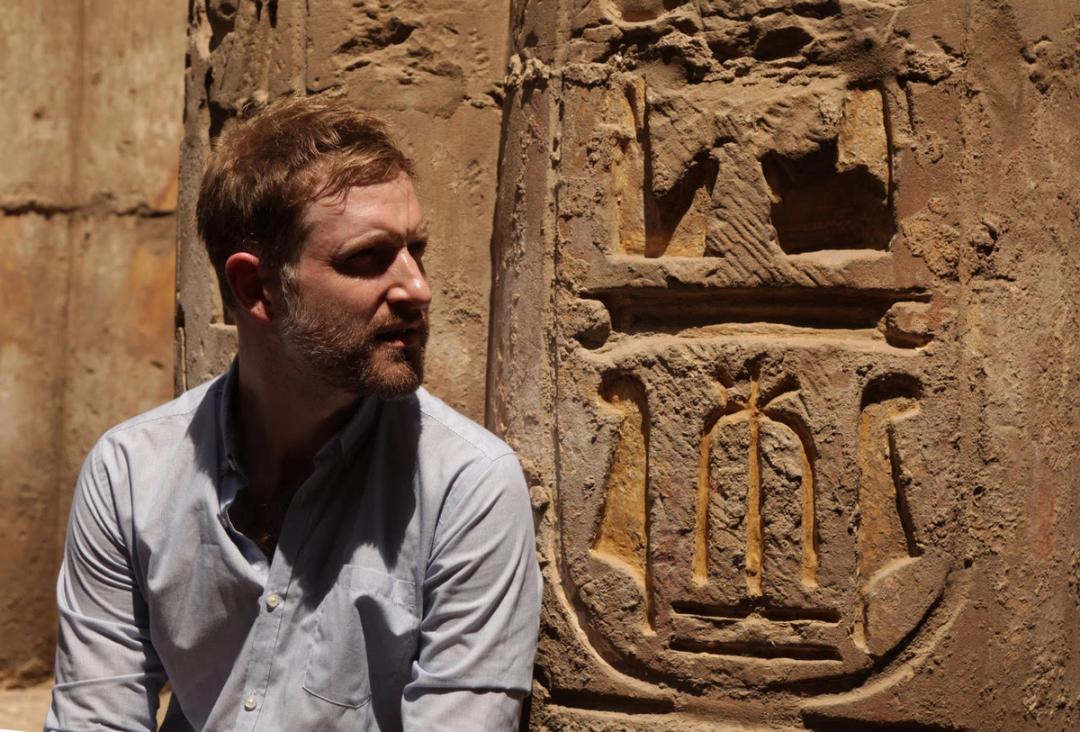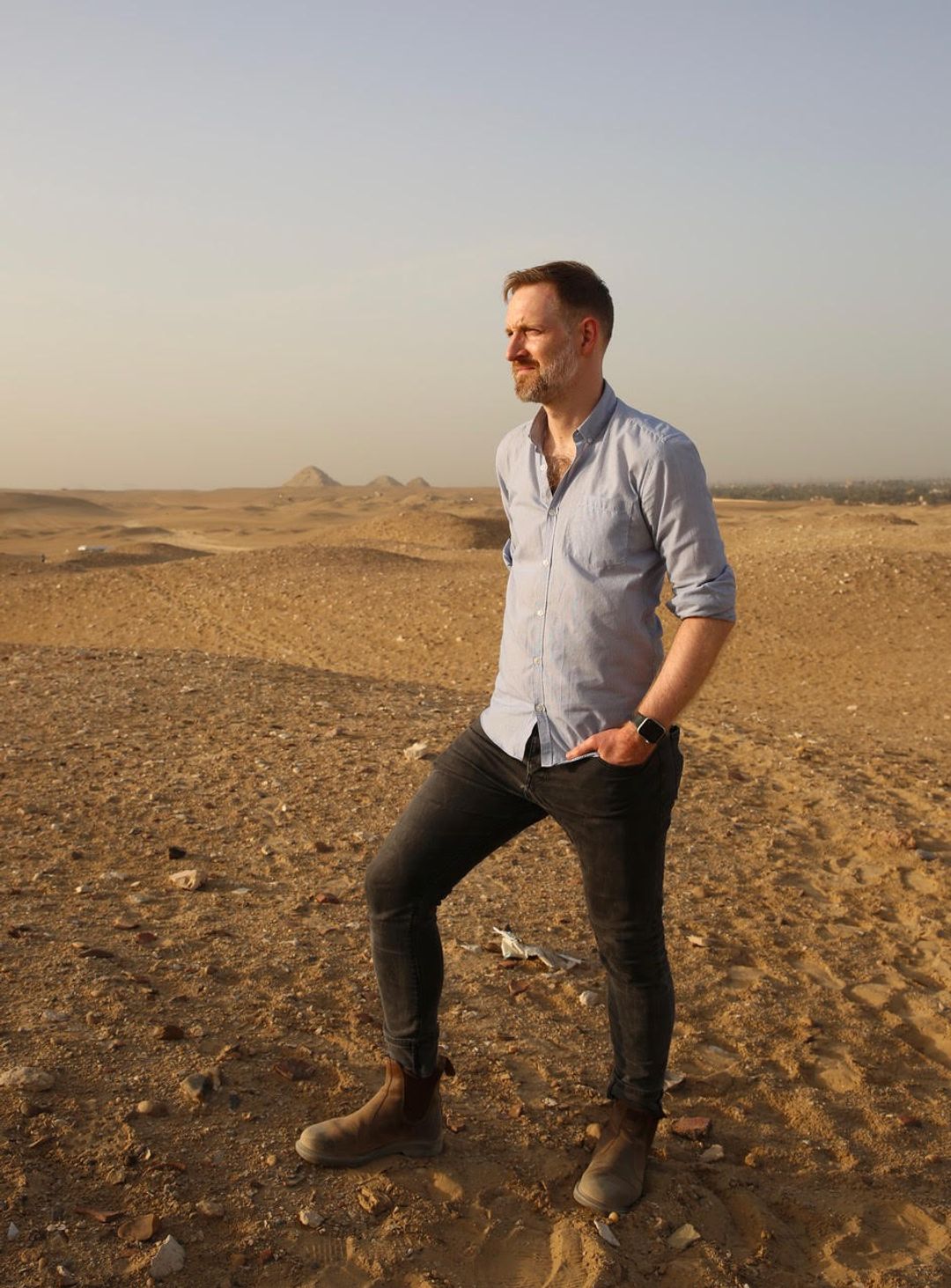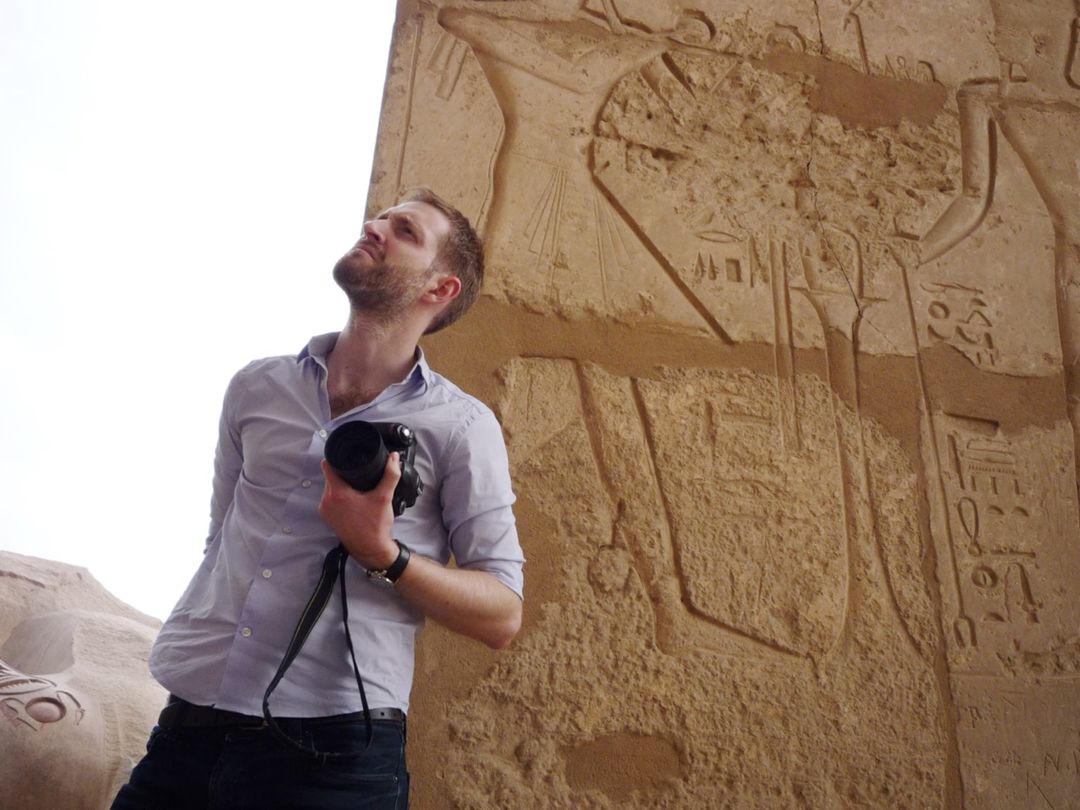Meet Dr. Chris Naunton
Egyptologist
Dr. Chris Naunton is a British Egyptologist, writer, and broadcaster. Rather than being affiliated with universities or museums, Dr. Naunton’s career derives from writing, media work, and teaching online. His work focuses on studying the history and development of Egyptology and archaeology in Egypt, as well as its presentation to the public.
STEM to the Sky
Mar 10, 2023
- What was your educational path like?
- Why did you choose Egyptology?
- How does Egyptology involve STEM?
- What is the most rewarding aspect of your work as an Egyptologist?
- What is your favorite project that you’ve worked on?
- What does a typical day in your life look like?
- What was your inspiration behind creating and sharing resources online through your platform?
- What skills would you say are important for a job like yours?
- What do you hope for the future of Egyptology?
What was your educational path like?
I was educated in the UK. At the University of Birmingham in the Midlands, I studied ancient history and archeology for my undergraduate degree. Things are a bit different in the UK from the US in that, in the UK, in your undergraduate degree, you specialize in your chosen subject from the very beginning rather than taking a more general range of courses and then specializing in a certain point. I studied ancient history and archaeology as an undergraduate degree for three years. Within that, I specialized in Egyptology, so it was studying everything from the history of ancient Egypt, archaeological sites and monuments, art history, language, hieroglyphics scripts, texts, and religion, more or less all aspects of ancient Egypt. Following my undergraduate degree, I did a master's degree straight away in Egyptology. That involved two classes, one in Egyptian language, one in Egyptian religion. Otherwise, the course was mostly a research focus course; I, over the course of a year, had to go away and research and write a dissertation on my chosen subjects.
After that, I had initially planned to apply to do a PhD at the same university, but a supervisor of mine recommended that I should leave university for a bit and have some kind of experience of the real world. She suggested that I apply to museums and archaeological projects to see if I can get work experience prior to getting a PhD. I decided I would apply for all the Egyptology jobs I could find knowing I wasn’t going to get one because I didn’t have the qualifications. My idea was that after a year, I would go back to university and do a PhD. But in fact, I got one of the jobs that I applied for, to my enormous surprise. It was just an administrative job, but it was good to get in. I found that I loved that job because it opened a lot of doors for me.
I did eventually a few years later do a PhD alongside my work, but the really crucial thing was that I had my foot in the door with an organization called the Egypt Exploration Society (based in London but has an office in Cairo) that runs archaeological projects. Once I got into the society, I could get a huge amount of experience and get to know people and how things worked outside the university situation.

(Credit: Dr. Chris Naunton)
Why did you choose Egyptology?
My undergraduate degree was in ancient history and archeology. When I was about 17, choosing what to do in university, I was interested in lots of different aspects of the ancient world—from ancient Greece to ancient Rome. Although I can’t be sure I remember this correctly, I think I already had a particular interest in ancient Egypt. The university that I chose did offer Egyptology, so I think that was probably part of my choice. Even before university, I was interested in ancient Egypt. I used to watch TV documentaries about it. With hindsight, I've come to think that what grabbed me had partly to do with Egypt being an amazing culture. It has huge buildings like the pyramids and temples, amazing art, sculpture, treasure like you find in the tomb of Tutankhamun, and the desert environment as well. I think there's something very alluring about the desert. All those things together made it very appealing for me. So I thought, this seems like the most interesting thing. Why not do that?
I think there's something very alluring about the desert.
Dr. Chris Naunton

(Credit: Dr. Chris Naunton)
How does Egyptology involve STEM?
Egyptology actually is not the same for everybody who does it. I write books. I do this through media work, so I do quite a lot of television work. I accompany groups of tourists to Egypt on specialist tours to visit sites and monuments. I do sort of bits of consultancy work as well.
Most Egyptologists have permanent positions that are either based in universities or museums. Broadly speaking, most Egyptologists are doing a mixture of research and communication of some kind. Most of us do bits and pieces of writing of one kind or another; most of us will be doing lectures of one kind or another. More and more Egyptologists are using social media and the web to convey what they're doing.
In terms of how STEM is involved in Egyptology, it varies from one Egyptologist to the next. It depends on how particular technologies might assist them in what they're doing.
To give a few examples, Egyptologists who are particularly interested in human remains (mummies) might wish to be able to virtually unwrap a mummy. That now can be undertaken with the use of medical technology like CT scanning. Mummies are put into hospital CT scanners, and that allows the researchers to see inside the body. It allows us to see the skeleton of the individual and to potentially look for clues as to how they might have lived and how they might have died.
For those people who are reading texts, for example, Papyrus texts, some are extremely difficult to read because they're not very well preserved; the text might be very faint. Particular types of photography or technologies that allow the use of infrared or various different parts of the light spectrum to be applied to those texts can suddenly see the writing much more clearly than you could with the naked eye.
Thinking about archeological sites in Egypt, up until relatively recently, the best way of finding out if there is something there is to dig. But we now have a variety of what we would call non invasive techniques, meaning ways essentially of seeing underneath the ground to establish what's there without actually breaking the ground. Those techniques might include magnetometry, electrical resistivity tomography, ground penetrating radar, and to some extent just close scrutiny and manipulation of satellite images, which can be used to identify archeological sites from the air as well. All of those are technologies that are borrowed usually from somewhere else, whether it's from medicine, photogrammetry, geology, climate sciences, or environmental sciences. Those technologies are all used to try and advance what we know about ancient Egypt. I think there's a lot more collaboration than there used to be.
I think there's a lot more collaboration than there used to be.
Dr. Chris Naunton
What is the most rewarding aspect of your work as an Egyptologist?
In terms of what I do on a regular basis, I find that the most rewarding part of my work is the writing because ultimately, in essence I’m a teacher. Obviously, I'm fascinated by Ancient Egypt, and I want to learn about it. But I also want to share that with other people. When I can do that, and when others tell me they enjoyed reading my book, that’s really good.
Aside from that, over the years, I have been very lucky to be able to visit archaeological sites in Egypt that are off limits to the public. Once or twice, I've been fortunate enough to see discoveries shortly after they'd been made, or in one case while they're being made. I was there at the opening of what we thought was an intact burial chamber of a princess. It turned out that it was robbed already, so that was not quite what we were hoping for. But it was still amazing to be there when it was being opened for the first time in thousands of years. I also got to see the contents of a tomb in the Valley of the Kings not long after it had been discovered for the first time and before anything had been moved. That was amazing because seeing everything exactly in place where it was when the ancient people left it there about three and a half thousand years ago was pretty mind blowing.
I also got to see the contents of a tomb in the Valley of the Kings not long after it had been discovered for the first time and before anything had been moved. That was amazing because seeing everything exactly in place where it was when the ancient people left it there about three and a half thousand years ago was pretty mind blowing.
Dr. Chris Naunton
What is your favorite project that you’ve worked on?
The first book I wrote, Searching for the Lost Tombs of Egypt (2018), I'm still very proud of. It did reasonably well. It didn't sell millions of copies and didn't make me famous or anything like that, but it was exactly the book I wanted to write. If I'm allowed to be proud of anything, I'm proud of that.

(Credit: Dr. Chris Naunton)
What does a typical day in your life look like?
I was filming an interview for a TV documentary yesterday afternoon, and I came home after that. I’ve just emailed the production team today with a few follow up notes on that. All day tomorrow, I'm giving a series of lectures. So I've just been going over my talk, making some notes, and looking at some things that I need to read.
I was doing a live event on YouTube on Wednesday evening, where we watched a film I'd made and then we did a question and answer session at the end. There's quite a lot of noise on social media about that still. To be honest with you, I’d love to tell you that what I do is reading ancient papyruses and looking at archeological sites—but actually, a lot of the time, I'm at my desk here at home using my library to answer questions or put together a talk. I don’t have a book to work on at the moment, but if I was writing, there would be books all over the desk, and I would be in the middle of writing something. In fact, I’m in the middle of writing something for my blog, which is about a project I was involved in last year, which used the video game Assassin's Creed Origins to teach ancient Egypt.
What was your inspiration behind creating and sharing resources online through your platform?
When I was a university undergraduate, I really thought my lecturer was really great at what he does. He is really clever and knows everything. I'd read a lot of his articles at this point. I can remember saying to a friend of mine, I don't think I'm ever going to be as good as this guy in how much he knows and how good his research is. But he was a terrible teacher… I thought to myself at the time, I can do that better than him!
I can also remember going a few years later to a lecture by somebody who was very highly regarded in my field and had written some really important things. I was quite excited to go because she had such a good reputation, and she was so boring. It just made me realize at that point that if you're too boring, no one will learn anything at all. I thought to myself, okay if you’re a brilliant academic with a huge brain filled with loads of information, you might have 100 useful things to say. But if you’re boring, everyone will just fall asleep, and they will learn nothing at all. I might have ten useful things to say, but if I'm interesting and I'm good at communicating, then people might learn eight things or even ten things, and that'd be amazing. That'd be much better than nothing. I love finding stuff out, but I really love sharing this stuff too.
What skills would you say are important for a job like yours?
The vast majority of people who are able to make a living in my subject are educated up to PhD level in Egyptology or something related. In terms of subject specialist knowledge, even if you don't need the knowledge, just to have a chance of applying for a job, you will have had to have acquired PhD level knowledge. Egyptology covers a lot of subdisciplines. It could mean being really brilliant at reading texts or being the world’s leading expert in identifying different types of coffins. But, you do need to have a lot of subject specialist knowledge.
Being good with languages is also really useful. Knowing how to read ancient Egyptian is not absolutely essential but it’s always useful, and most Egyptologists do a bit of it.
I always think that good people skills are important because there are very few jobs where you don't have to interact with other people. Most of the other things I can think of are not really specific to Egyptology. An ability to be well organized is very useful, and computer literacy now is indispensable.
What do you hope for the future of Egyptology?
What I hope is that we will continue to learn new things about ancient Egypt. The most obvious way that might come about is that we will make new discoveries in Egypt. This new material will help us see what life was like in the past in Egypt.
What might be different in the future from the way that things have worked in the past is that Egyptology will be less dominated by Westerners and led much more by Egyptian specialists. That's already happening, and I think that's entirely appropriate.
I don't know what new technologies might come to be adopted by people, but for me, if lots of people out in the general public are still interested in Egyptology and still want to read books, go to museum exhibitions, watch TV documentaries, read about information online, and visit Egypt to visit and study sites and monuments, I think that'd be great.
What might be different in the future from the way that things have worked in the past is that Egyptology will be less dominated by Westerners and led much more by Egyptian specialists.
Dr. Chris Naunton